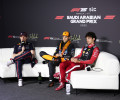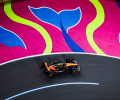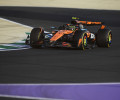F1 - 2020 HUNGARIAN GRAND PRIX FRIDAY PRESS CONFERENCE
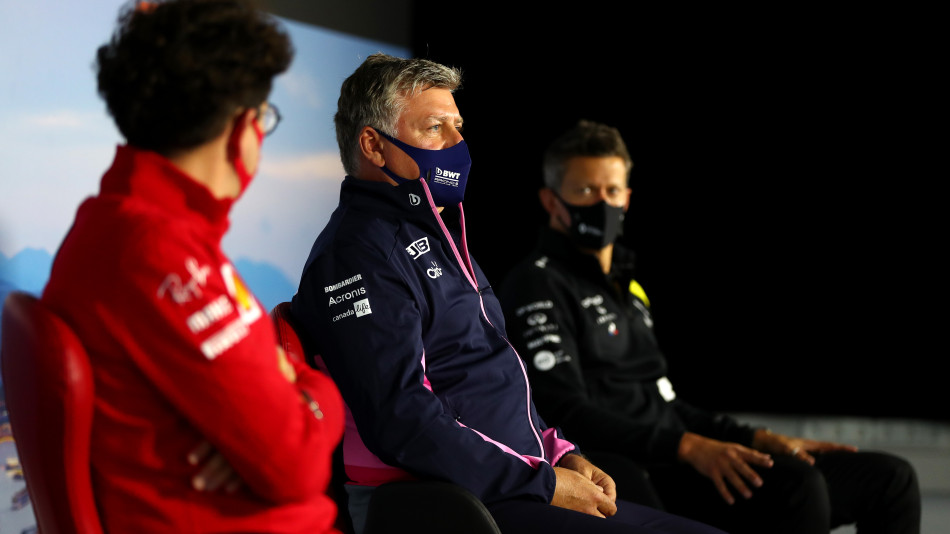
TEAM REPRESENTATIVES – Mattia BINOTTO (Ferrari), Otmar SZAFNAUER (Racing Point), Marcin BUDKOWSKI (Renault)
PART ONE
Q: Let’s kick this session off, if we might, with a quick summary from each of you please about how FP1 went today. Mattia, could we start with you please?
Mattia BINOTTO: Obviously after FP1 it's always very difficult to judge: you’re focussed on your own programme. We’re running here the parts we brought already in Austria last week. We obviously had wet sessions, had a very bad race, very short, so really we didn’t have an answer from them, so today the programme for us was really to understand the car, and then try to find the balance for the rest of the weekend. We’ve got again a lot of data to analyse. I don’t think we’ve got yet an output but the two drivers certainly are focused on the weekend. We know that quali will be important here. Grid position is key in Hungary, so we need to prepare well for the quali tomorrow. Likely that we’ve got a wet session this afternoon so this morning session was important really to collect data and try to somehow understand the car, the balance in order to be ready tomorrow.
Otmar?
Otmar SZAFNAUER: Not a perfect session for us. Sergio didn’t get his long runs in at the end so we’ve got a little bit of understanding to do. One lap pace looked OK, the balance was good but it’s really hard to know what everyone else is doing. Yeah, single lap pace looked better than in years past for us. And long run pace, I still think we need to work on a little bit.
Marcin?
Marcin BUDKOWSKI: It went pretty well. We executed our normal Friday morning programme. We didn’t use the Soft this morning, we just did runs on Hards and Mediums. Pace is encouraging. Both drivers felt that they could improve the balance so they could go a little bit quicker. Daniel was a bit happier with his car than Esteban was and so, yeah, a good start to the weekend. Again, it’s Friday morning. But it’s looking positive at this stage.
VIDEO CONFERENCE
Q: (Adam Cooper – motorsport.com) To all three of you. I think on Wednesday you had to tell the FIA how you plan to deploy your freeze tokens. Can you talk a bit about that process? Have you made that call? Is it frustrating that you can basically only really change one thing?
MBi: We submit our tokens. We somehow try to address whatever we can for next season in terms of car development, trying to understand what are the most weaknesses of this season. The token system has been put in place ahead of the entire freezing we’ve got. I think it was important to have at least two tokens. It’s obvious that system is overall, let me say, a compromise of the current entire situation post-Covid. We cannot be fully happy because, if you look where we are as Ferrari, our intention would have been to fully develop but we understand the point and I think that’s part of, as we often said, part of the season compromises that have been taken during this period. And I think, as Ferrari, knowing our situation, we have been assessing it as an act of responsibility towards the entire Formula 1 and the other teams. So that’s what we’ve got. We’ve chosen our tokens. I think that the only point on looking at next years, on which we are still debating, I think we are not fully happy that there are teams that eventually can upgrade their entire package from a 2019 to a 2020 package. That I believe would be unfair, because the season with two tokens is similar for everybody. We’ve got only two tokens and everybody should be limited to that one.
Otmar, your thoughts.
OS: We too decided a while back to look at how to use our tokens. We’ve made our selection. I think the token system itself works well and when you have a variety of elements across all the teams, and how do you allow certain developments for some and other developments for others. So I think the token system was a clever way of allowing some freedom but within the confines of what we decided to do to save money going forward because of the virus situation. So, I think it’s good, it’s fair and we chose already how to use them and that’s what we’ll do. We’ll make those changes for next year and see how we go.
Marcin?
MBu: I think not a lot to add. It was a necessary evil to be able to save… well, to be able to continue in this situation and part of the freeze decision for next year. So, we’re happy with the system. We’re still looking at where best to spend them. We still have a few days and a few opportunities that we need to choose between but I will also support Mattia’s view that the system has some flaws, unfortunately. There’s a loophole there that would allow a couple of teams to benefit from the system and this is something we’re discussing with the FIA and the other teams and we hope will be addressed.
Q: (Dieter Rencken – Racing Lines) As we know, Ross has said that after everything was planned for closed races, etcetera, the next imperative was to look at the Concord Agreement. Could you please indicate where you stand on this? Whether you’re ready to sign? Particularly Ferrari, Mattia please, because obviously you stand to lose the most under the Concord. And then with input from the other two as well please.
MBi: The Concord Agreement and where we are today is the output of long discussions we have between the teams and certainly with the F1. As far as Ferrari, we are ready to sign. We would like to sign it even, I think, quite soon. I think that’s important for the future. For clarity. At least we can all know where we are. I think it’s important as well for the small teams, somehow because that’s part of the entire, let me say, package. So, looking ahead with clarity is important. So somehow ready to sign. I think we are as well somehow happy because we know that F1 has understood the importance of the role of Ferrari within F1. And for us that was key. And somehow satisfied from that.
Marcin?
MBu: Yeah, I think it’s a process that’s been delayed a little bit by the Covid situation and it’s resuming now, understandable. I have no particular comments to make on it. It’s a step forward for the sport certainly. The sport, looking forward from ’21 and especially from ’22, with the introduction of the cost cap, the fairer prize fund distribution. It’s going in the right direction. It’s certainly things that we are supporting at Renault. A fairer, more sustainable Formula 1. So, really, it’s looking at the position from our side as well.
Otmar:
OS: As was previously said, this was a logical incrementalism to get to this point. I think a lot of work has gone into it and I don’t think we’re that far off to having something that we can all sign but there’s still a few talking points which I think will happen in the short terms.
Q: (Mark Hughes – The Race) Just to follow up that point on the Concord with Mattia. We understand the broad agreement has been there for quite some time but it’s still not a universal agreement. Can you touch a little bit on what the sticking points still are?
MBi: Honestly Mark I’m not really capable of answering you because, as I said, as Ferrari, we are happy and ready to sign. So I think the question should be asked to the ones which are not fully happy yet.
Q: Otmar, talking about the protest from Renault. Parts of your car have been protested by the team. Were you expecting the protest and what’s your reaction?
OS: There were rumours of a potential protest in Australia so our expectations were that something would happen. My reaction is that we now have to put together the evidence to show that we’re completely legal and I think we have three weeks to do that and that’s exactly what we’re working on now.
Q: Perhaps throw that on to Marcin. Why have you protested the RP20?
MBu: I don’t want to get dragged too much into the details of the protest because, as you can imagine, there’s a stewards’ decision pending. There’s an FIA investigation ongoing which will be submitted to the stewards and they will make their decision based on this. It might go to the court of appeal if Racing Point or ourselves are not happy with the judgement. So, it’s a process that’s still ongoing. But I think for us it’s important to clarify. To clarify what is permissible and what isn’t for this season. For the event we protested but for the rest of the season, for next season – but also what Formula One we want in the future. What is the model we want? Do we want the model where we have ten teams independently fighting each other, especially in the context of a fairer sport, a more equal distribution of funds, a cost-cap, so all teams eventually coming to a similar level of spending. Maybe not straight away but with time. So I think there’s a great opportunity, together with the technical regulations, cars being able to follow each other, overtake each other, better racing. We think there’s a great opportunity for the sport to have ten teams, maybe more, fighting really on equal terms. And for us it’s important to clarify what kind of level of exchanges is permissible. Is it permissible to get parts or get geometries from another team and use them on your car or not – because we don’t think that’s the right model for F1 in the future. It’s really beyond the protest, beyond this race. It’s what kind of model we want for the future of F1.
Q: (Andrew Benson – BBC) Question for Mattia initially. Mattia, you said at the first Austrian race that the engine had lost some power over the winter, into this season. Can you explain why that’s been the case?
MBi: Yep, certainly. I think that regulation is very difficult and complex. I think there are areas of the regulation of the power unit where maybe clarifications are still required. It’s an ongoing process which has always existed in the past and will exist in the future. Since last year a lot of TDs have been released. Eventually clarifying some of the areas in the regulations. I think that through those TDs we had to adapt ourselves. I don’t think it’s only the case of Ferrari, because looking at the power output of this season, many others, most of the manufacturers somehow had to adapt themselves. But certainly as Ferrari we had to adapt and as a simple output of that, we lost some of the performance we had. I think that obviously now we have more clearer situation of some areas of the regulation. Hopefully that will continue, if required for the future.
Andrew, have you got a follow-up question?
Q: (Andrew Benson – BBC) This isn’t for Mattia, this is for Otmar. Otmar, yesterday Sebastian Vettel said that he’d had loose talks with Racing Point. Which driver are you considering dropping?
OS: Well, y’know, they’re both contracted and we’re happy with the drivers we have. It is the silly season already which I just can’t fathom because we’ve only done two races and we’re already talking about driver changes but we’re happy with the two that we have and they’re contracted.
Q: (Alan Baldwin – Reuters) Similar question to Otmar about Checo. He’s widely credited with saving the team. He’s outperforming his team-mate. What can you say directly to him to reassure him that he will have a seat next season?
OS: Like I said, he’s contracted. Checo’s focus really is to do the best he can this year with our car and I think he’s had two great races, coming from seventeenth to… well, he had a little bit of an accident but I do believe he should have tried to overtake Albon at the end. We had the pace to do it. It didn’t quite work but Checo just has to focus on the task at hand, which is qualifying the best we can and putting good races in.
Q: Otmar, what qualities do you think Sebastian has as a driver that would be useful to any team? He’s a man on the market.
OS: He definitely knows how to win, he’s very competitive. Might be a good question for Mattia. He probably knows him better than I do. But, y’know from the outside, I know him as a friend, he’s a lovely guy. I’ve known him for a very long time. Straightforward, honest, and can be very fast. Four time World Champion.
Q: Let’s throw that to Mattia. What qualities does Sebastian have that he would take to another team.
MBi: He is fast, he is experienced. He is a four-times World Champion, so, as Otmar said, he knows how to win. He is a leader in the team. So I think he’s got plenty of the right attitudes. He’s a talented driver so no doubt Seb can fit in whatever team and hopefully he will find his position for the future.
Q: (Scott Mitchell – The Race) Question to Mattia. You mentioned there have been these clarifications over the last year or so, and you and others have had to adapt, and been affected by it. How difficult do you think it will be to get on top of that – because, by the time the 2021 season starts, the engines will be homologated for a long period of time – so presumably you don’t have much time to actually get on top of whatever the setback has been.
MBi: Engine or power unit development is an ongoing process that we never stopped since 2012 when we started developing those engines. Now it’s a long time we were developing them. We were doing developments as well for this season that we will not be able to introduce during itself because we had a long shutdown period before the start of the season, which has not been the case for other power unit manufacturers by the way. We will still develop and we try to – somehow – develop as much as we can by the start of next season. That’s one point. On the other side, as I said, I think there are still areas of the regulations that need to be clarified and hopefully that may be done in order than in the future at least there are sufficient clarity on the regulation to ensure we’ve got all the same understanding.
Q: (Sandor Meszaros – Autosport es Formula Magazine) Mattia, it is to you. When you were promoted to the position of team principal, did you expect the job to be as hard as it’s proving right now?
MBi: Certainly the job is difficult. Certainly when you are not doing well, as we are not, you’ve got a lot of pressure – from the outside mainly. But I think we are putting, as well, a lot of pressure on ourselves because we know what’s our objective, certainly as Ferrari. But it’s 25 years I’m working in Formula 1. It’s not the first time we’ve had difficult seasons in Ferrari. I remember very well how difficult it is so when moving in that job , I was certainly expecting difficult times. More important, when you’re in those times is to keep stability, to remain focussed and really making sure, as a team, if there is anything that needs to be addressed or improved, you’re making the right decisions and moving forward for something better.
Q: (Laurence Edmondson – ESPN) Otmar, just for clarity are you in a position to confirm that Lance and Sergio’s contacts will mean they remain at the team as drivers or could that change?
OS: It’s tough to predict the future. Like I said, what they need to do is do the best they can. They are contracted and watch this space, we’ll see where we go. But our intention is never to not honour our contracts.
Q: (Abhishek Takle – Mid-day) Otmar, just to follow up on that, by when do you need to make a decision on your driver line-up. You said watch this space but by when do you need to make a decision and communicate it to your drivers and when would Seb have to make a decision if the ball in his court?
OS: There’s no time line. Like I said, we’ve had two races, we're in our third of the season and it’s silly season already so there is no time-bound decision-making process.
Q: (Luke Smith – Autosport) Mattia, we had Andreas Seidl from McLaren talking a little bit this morning about the Renault/Racing Point protest and he said F1 could risk becoming a copying championship depending on the result of the protest in terms of teams’ integrity as independent constructors. What do you see for F1’s future from Ferrari’s point of view? Do you think it’s important to protect the integrity of the independent teams as constructors or do you think the floodgates might be opened for more of this sharing between teams?
MBi: So, first on the protest, I think the regulations are pretty clear and I’m pretty sure the FIA will be in the position to make the right, proper judgement and that’s left to them. On what should be the future during the Covid period, during the discussions as Ferrari we brought at least as a proposal to consider customer… the big teams, as we’ve eventually got in MotoGP for example, but that proposal was pushed back by the entirety of, let me say, the teams and F1 and the FIA, which we fully understand. I think that has been a decision we all took together. I think as Marcin said before, somehow, we decided that each single team should be independent, they should be capable of doing their own proper developments, I think they have the means now with the new Concorde Agreement and the regulations are sufficiently clear to do that. So yes, it will be great to have 10 teams, 10 different cars certainly on the grid.
Q: (Christian Nimmervoll – Motorsport.com). A question to Mattia and Marcin regarding the investigation that’s going on against Racing Point and of course if Otmar wants to comment on it as well, happy to hear. In this investigation Mercedes is asked to provide brake ducts. Now, I’m not suggesting in any way that in this particular case there is any wrongdoing going on. But in terms of the investigation system, what can be done if a team is asked to provide evidence that no fake evidence is provided. Are you confident that the system is bulletproof?
MBi: As I said before, I am fully confident in what the FIA is doing. That is their job and that is their task and I’m pretty sure they will do it properly.
MBu: I fully trust the FIA team. It’s a good team there and I know what I’m talking about because I worked closely with them for a number of years, so I think it’s in good hands. To the specific questions of Mercedes being asked to provide parts. When we contend, as we do, that Racing Point has used geometries or designs from another team, you need to find out by comparing them, so it’s a logical part of the investigation but the concerns we have are against Racing Point.
OS: Your question was is it bulletproof? I think the process is bulletproof. We’ll provide all of the evidence that was asked of us and I think the outcome will be bulletproof as well, which is quite nice as there are things that the camera can’t see, especially the internal surfaces of a brake duct, for example, that we completely designed and developed ourselves and then when your compare the two parts by the FIA then you will absolutely know the brake ducts are unique and our IP and designed by us.
Q: (Christian Menath – Motorsportmagazin.com) Marcin, first of all can you explain why you lodged a protest against the brake ducts as there are quite a few similar parts on the Racing Point to last year’s Mercedes. And secondly, you said earlier that you expect a decision beyond just the protest and you want a clarification. Do you really expect it because a stewards’ decision is usually just, is it in breach of the regulations or not?
MBu:The first question, why the brake ducts? The main point here is that brake ducts are essential performance differentiators on today’s Formula 1 cars. They’re not only there to cool the brakes, they are an essential aerodynamic device both at the front and the rear in terms of extracting aero performance. But they are also essential in controlling the tyre temperatures and we know that tyre temperatures are fairly important in formula 1 nowadays. That’s one of the reasons and the other reasons, as Otmar touched on, is that they are surface that are visible to the eye and to the camera of the numerous photographers that go up and down the pit lane, but there are also surfaces that are impossible to see from the outside and it would be difficult to copy from pictures. Second question: why I expect, why was I saying it’s about the future of Formula 1? No I don’t expect the stewards to rule on the future of Formula 1, that’s not their role, that’s certainly not what we expect from the decision. We do think, however, that the decision will have implications on the model of Formula 1 if you want. If the stewards allow a certain amount of exchanges between the team then I think it will lead to a different model than if they are strong and say these are the regulations and it’s really important that every competitor, every team designed its own car.
Q: (Dieter Rencken – Racing Line/Racefans.net) A question for Marcin. On the first of July the new CEO for Renault, Luca De Meo, started work. Are you expecting him to hand down any policy decisions about the team’s future? It could go either way, he could be fully in favour of Formula 1 for the next 30 years or he could be totally against it. What are you expecting?
MBu: It’s very early in terms of his tenure at Renault but he’s extremely positive about the Formula 1 programme and he’s actually very interested in it himself. It’s a bit above my pay grade to talk about the future of the team and the future of motorsport at Renault but there is a very good dynamic with his arrival and it’s certainly extremely positive for the team and there is absolutely no discussion about the future of the team in Formula 1. In fact, it’s quite the opposite.
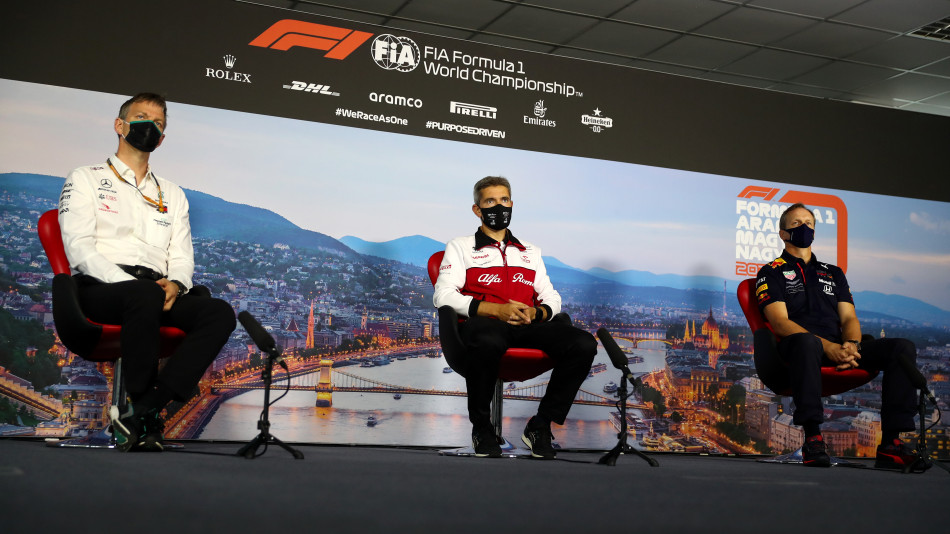
TEAM REPRESENTATIVES – James ALLISON (Mercedes), Xevi PUJOLAR (Alfa Romeo), Paul MONAGHAN (Red Bull Racing)
PART TWO
Q: Gentlemen, can I get a quick summary from you about how FP1 went this morning. James, why don’t we start with you?
James ALLISON: We had a decent morning. We ran all three tyres. Both drivers were pretty happy with the balance of their car and the car looked pretty pacey, so it was a good session.
Q: Xevi?
Xevi PUJOLAR: For us this morning we had Robert and Antonio in the car. We went through our test programme. The conditions were a bit cold and there is still a bit of work to do, especially with the harder compound and looking forward to FP2 with some changes to improve on the tyres.
Q: Thanks, and Paul?
Paul MONAGHAN: Not our finest 98 minutes. We still have some work to do. We ran predominantly the softer tyre, which didn’t stand up as well as the other two. But Knowledge garnered, improvements to follow and we’ll see what P2 weather brings and we’ll go on from there.
Q (Dieter Rencken – Racing Lines/Racefans.net) Xevi, obviously the Covid pandemic has affected team budgets etc. Could you explain whether or not it has impacted on the development programmes of your team going forward? Will there be updates coming as regularly as usual?
XP: Yes, despite the conditions of the current situation we keep on with the development, just to fight in the midfield, so on that aspect we will push as much as we can with Corona conditions.
Q: (Andrew Benson – BBC) James, Mercedes has produced another stonking car this year. How do you explain it? What qualities does the team have that make them so much better than anyone else?
JA: Well, we’ve had a promising start to the year but let's remember we’re one track and two races in. I guess we’re lucky: we’ve been a well-funded team, we’ve been a stable team, we’ve had strong support from our parent company and consistent leadership. But I think one of the best things about the place is that it has a good culture. And the culture is one of not resting on its laurels, never feeling entitled to the performance we’ve enjoyed and being willing to pass the challenger of finding improvement in the car down from the top of the team through the layers in the team so that everyone feels a part of making the car stronger, racing the car more strongly, providing us with the environment in which we can make that strong car, all parts of the many-cogged machine that is an F1 team play their part in producing what you see. It’s not a single answer; it is down to a team with a good culture in it.
Q: James, Lewis spoke yesterday of the W11 being a more refined car than last year, the best car, he says, you guys have produced. In what areas did you focus your development?
JA: Well, we do the same things we would ordinarily do and what every team in the pit lane does, so we go looking for downforce and horsepower and an ability to look after the tyres nicely, but we have been on a… I hate this word, but we have been on a bit of a journey for three or four seasons now from a quick but very edgy in 2017, understanding why that car was edgy, why it had highs and low and then gradually chipping away, having, we think understood that, chipping away at what is it that made that car edgy and turning the subsequent cars in ’18, ‘19 and now in 20, turning them into weapons that are able to deliver their performance in a much more broad set of circumstances.
Q: Paul, on the subject of Mercedes performance. Are you surprised by the gap to Mercedes this year?
PM: A little bit disappointed is I should think the correct answer as opposed to surprised. It’s interesting isn’t it? You do your most diligent job with a team of very skilled people and you put your car on the track and you’re judged relative to your opposition. In pre-season it looked like we were close, a sniff behind perhaps. The first Austria race wasn’t terribly kind to us. All credit to everyone in the team, they pulled together and sorted it out for the next race. OK we’re on the podium but we’re a little but behind them and yeah it’s all work to do now. We have to try to catch them.
Q: Can you put a little more flesh on the bone there? Where did you improve the car from Austria 1 to Austria 2?
PM: Primarily in the aerodynamic area. Clearly there were two reliability fixes applied as well, so they came with a reasonable amount of effort. It’s a thing to say ‘oh, we’ll just fix that’, there’s no such thing as a ‘just’ job. So effort went in in all the areas but the performance gains came primarily from the body work.
Q: James, Valtteri said yesterday that he feels confident of remaining with Mercedes next year. Can you explain why, when there is a driver of Sebastian Vettel’s calibre on the market, you are not looking at someone like him?
JA: I think Toto has answered this question on a number of occasions but if I can concentrate on our own line-up. Why would we wish to move away from a line-up that has produced such strong results, a respect across the garage between our two drivers that has been evident for all to see and a level of performance from both men that I think many people up and down the pit lane would envy. Why would we want to step away from something that is clearly working and try something else, which is fraught with yes maybe some opportunity, but also lots of bear traps in it too.
Q: (Scott Mitchell – The Race) James, Mercedes have been brought into the Racing Point/Renault protest because it has to provide brake ducts for comparison. Is that just normal procedure and easy to get on board with or is there any frustration about what that sort of request might imply about what Mercedes has done in this case?
JA: No, I think it’s pretty straightforward. There’s an argument between Racing Point and Renault and in order to settle that argument the FIA need to seek some information from us because the dispute is about what brake ducts Racing Point are running and so we’re perfectly happy to provide them with the information they asked for on last year’s Mercedes brake ducts.
Q: (Luke Smith – Autosport) James, DAS has been the big innovation for Mercedes this season. Is there any more development you can do with DAS further through this year? How much more can you add to it or have you stopped everything in its tracks as you already have it on the car and won’t be allowed next season?
JA: I think that for us it’s still a very new system. Precisely how, where and when we get the most opportunity from it is to some degree continuing to be a voyage of discovery for us, and the manner in which we develop it is still open for us as the seasons goes on. So it’s not a closed book and we hope to get more from it if we can learn quickly in the coming races.
Q: (Frederic Ferret – L’Equipe) Paul, it’s five years that you’re worked with Max. In which areas has the driver improved?
PM: Gosh, he won his first race with us, didn’t he, so he sets the bar quite high, doesn’t he? I think what I’ve seen from Max is that he’s become a more complete driver, so his understanding of the car, the tyres, his racing skill was always a great strength. His pace is phenomenal. I think he’s learned how to be a greater contributor to the team and he learned how to work with a very competitive teammate in Daniel and he’s learning to work now with Alex, so I think he’s just maturing as a person and a contributor to your team. We’re blessed to have such an asset.
Q: (Christian Nimmervoll – motorsport.com) Paul, this circuit is very different to the Red Bull Ring in terms of characteristics. Mercedes was quite impressive with their performance in FP1. If this continues for the rest of the weekend and they continue to be ahead by like half a second like they were last weekend, how worrying is that for the remainder of the championship? And vice versa, can I ask Mercedes the same question?
PM: I don’t think I would describe this as worrying. I think what it is, is it’s set the bar that we’ve got to develop faster than Mercedes to challenge them for the championship. We can do that, we have done that in the past. Can we do it again? I think it’s entirely within our grasp but it also depends on what Mercedes do. So worrying? No. Challenging? Yes, enormously. We’ll working with Honda and we’ll make the package as good as we can and if that means we can catch the Mercedes, great, and… It doesn’t actually change what we’re going to do, it more just defines how much we have to catch them by and then it’s down to them as well.
JA: I think probably, sort of in the question, is an assumption that this is just an easy cakewalk and I can just say it doesn’t feel like that sitting our shoes. In our shoes, we think OK, we went to Austria, a track that we haven’t been strong at in the past and we had a decent performance in the second race but we were in a fistfight in the first. And we’re now at a second track where we ran on greasy cold asphalt against Red Bull who were clearly not running their engine at the same level of power that we had chosen for that session and the gap looks bigger than it truly is. We’re expecting this year to be a fight. We’re expecting to have to develop strongly because if we blink we’ll be swallowed up. If you want evidence of that, take a look at Friday of the second Austria where we went from looking pretty good in the first Austria to looking worse than average. We were beaten handsomely in free practice on Friday because we weren’t paying enough attention and if we don’t pay enough attention, either to how we approach each race weekend or how we develop the car through the year, we’ll get overrun very, very quickly.
Q: (Phil Horton – Motorsport Week) Xevi, was Alfa Romeo’s low key performance in Austria, particularly in qualifying, a one-off or did the car perform in line with expectations?
XP: Yeah, in qualifying, for one lap performance it was worse than what we expected but then I think it’s an area we are working to improve. In the race, the pace was better and we were able to fight with the midfield competition so yeah, that’s an area that we were expecting more in qualifying and we are working on it.
Q: (Christian Menath – Motorsportmagazin.com) Paul, after Austria it was said that Red Bull was fast in the slow corners while Mercedes is very fast in the fast corners. Now we have a lot of slow corners and you’re pretty far behind. Of course, it’s only FP1 but where do you lose the time now?
PM: Well, as James mentioned earlier, our engine mode did not match or was not, shall we say, at an equivalent level to that of the Mercedes, so clearly there’s a chunk to be earned on the straights. Cornering-wise, we were on a different tyre compound to the Mercedes and as such, I think when we have better behaviour from our tyres our cornering pace will pick up a huge amount and as such, if we’re then gaining on the straights and the corners, it should be a decent step and we will see where we are relative to them later in the weekend.
Q: (Jonathan McEvoy – Daily Mail) I’d like to ask James, who spent several years with Ferrari, maybe your perspective on what it’s like to work for Ferrari and what it’s like when things don’t work very well at Ferrari, when they’re going through a rough spell. What are the unique demands that you’ve seen at Ferrari?
JA: Well, clearly, I wouldn’t have gone back to Ferrari a second time if working there was a miserable experience. I had two very important parts of my career at Ferrari and have massive affection for the brand, for the people there and I hope they wouldn’t mind me saying I’ve got many friends in that team. So working at Ferrari is in many ways an unalloyed joy but the country is so pro the team, the brand is so strong, the history and heritage of Ferrari is so important that you do feel that you are part of something that is itself important and that is a real strength for that group, but it’s also probably their biggest burden that they carry too because along with that affection and joy that the nation shares in Ferrari’s successes comes a great deal of pressure when things are going poorly, and that pressure is externally applied from the press in a much more intense way than any other Formula One team. It is internally applied from just everyone who feels the duty to be living up to the great performances that the team has showed in the past and it is, I think, most powerfully internally expressed by a top down leadership style that at Ferrari is probably more exaggerated than in other teams and that tends to make the team make short term decisions and can lead it astray instead of building fundamental strengths that will carry it from year to year. So it is a real mixture of these heady highs and base lows which have, at their root, the same origin which is the huge desire within the team and without, for the Ferrari brand to be fighting at the front of the field.
Q: (Erik van Haren – De Telegraaf) Paul, when you look at the aerodynamic development of the car, did Red Bull make a big step when you compare RB16 to last year?
PM: I don’t know how you define a big step. We took the biggest step we could in terms of adding outright load to the car as well as observing the criteria we have for the stability of it, the behaviour of it. So yes, by our previous judgement, the step from last year to this year was a reasonably encouraging one so probably the biggest we’ve ever made? Probably not. Probably a decent step? Yes it was and we’ll continue to work with it. These things don’t stand still, do they? We’re already quite different from the car that was in Barcelona to Austria one and two and then into Hungary.
Q: (Dieter Rencken – Racing Lines/Racefans.net) James, last year in Brazil you were the top man there, effectively acting as team principal. Are there plans for you to do a similar role this year at any of the races, particularly given the very, very tight calendar that we expect?
JA: It’s not… the calendar and who’s attending where is not set in stone at the moment but if Toto were to wish to ask me or anyone else to stand in his shoes temporarily at a given race weekend then that’s what we would do but the actual who’s going where, when is not set in stone.
Q: James, did you enjoy the experience in Brazil last year?
JA: My main feelings about that Brazil are coloured by the way it turned out so… We had a poor showing on Sunday, made a bunch of dumb decisions for which with me in Toto’s shoes, I felt very responsible and so I don’t enjoy remembering having let the team down in the way that I felt that I had but I was very proud that Toto felt confident to ask me to do that job and I hope that were he to feel confident to do so again in the future I hope I would do so in a way that was rather more creditworthy than the first time round.
Q: (Scott Mitchell – The Race) To all three, it touches again on the Ferrari situation: we’ve seen before that when a team takes a big departure in car development direction from one season to another there can be big consequences attached to that. I’m thinking McLaren from 2012 to 2013. What are the risks attached to a fundamental change in what you’re trying to get out of your car from year to year and how easy do you think it is to actually trip up when you’re doing that?
PM: I guess the risks are that you are not sufficiently thorough in your research and development to exceed the performance of the previous car because if your departure is of sufficient magnitude that you don’t have the legacy of the previous car to build against… validate against… to test against, then your risk is somewhat obvious from there. When we have a big rule change, which is a big opportunity, you’re absolutely right that the less we have from the previous car, the more vulnerable we feel to be to errors in some areas and your reference, if you like, is less relevant than it has been, so the risk is rather obvious and validation ultimately is how quick you are on the track and then it’s how thorough a job you’ve managed to do in the time available and the research tools you have.
XP: Yes, I agree with what Paul says. When you do a big change probably it’s when you lose your reference and if you look at this calendar for this year, OK, we have less races but everything is very compressed so you need to be very dynamic if you need to apply changes or if you think you are diverging. That’s probably the most difficult… and you have so many races together there’s not much time to react. You need to be very dynamic to get back to your references.
JA: I think I’ve used this analogy before but it bears repeating. Developing a racing car is a bit like being on a mountain in the fog. You know that you’re going up when things are going well, you’re climbing up this slope and as you climb up the slope your car is getting faster but it’s foggy and you know that there are other mountains nearby and that they’ve got other climbers on them and you know that those people are going up mountains as fast as they can. When you start to feel the slope of the mountain get less, you wonder and you worry about whether or not that’s because you’re nearing the top of your mountain and that actually it’s time to start thinking about being on a different mountain, choosing a different concept and being brave about the fact that the one you’re on is simply not going to be good enough to let you carry on climbing but you don’t know because it’s all surrounded by fog, you can’t know for sure what lies in front of you. So when you decide that you’ve had enough of your mountain and you fancy someone else’s, you absolutely know that the first part of that transformation is going to be going downwards, you’ve got to go through the valley first before you can climb up someone else’s mountain and that could be a good gamble, you could find yourself on a much better mountain in the future and you could find yourself quickly going past where you were previously but it’s as scary as hell and the temptation to stay on the slope you’re on and keep working that slope is very very strong. So what most people try to do is to put a certain amount of their resource into working the slope they’re on but having a portfolio of other attempts that are braver in diverting away from their main attempt and just seeing is there a glimmer of promise here, is the valley looking a little bit less treacherous than I thought? Is it worth me putting more effort into those areas? And once you get a sniff that that other area starts to look attractive then you throw more people across into it and hopefully end up climbing a better slope afterwards. But it’s a scary, scary process because you’re always surrounded in fog and you know that if you jump from one hill to the next then you might be making a mistake.
Q: (Alan Baldwin – Reuters) Question for James just to clarify something because the line was a bit dodgy and I didn’t hear the beginning of the question: you said about Seb… why would we want to step away from something that’s clearly working, regarding your current drivers? Can you therefore just say that it’s Valtteri and Lewis next season unless either of them wants out?
JA: You need to speak to Toto for the answer to that because this isn’t my part of the company but I do know that our current driver pairing is strong and delivers good results for us so if you want to know more intimately what our thoughts are on the future, then I’m not the right guy to ask.
Ends.

 Facebook
Facebook Twitter
Twitter

